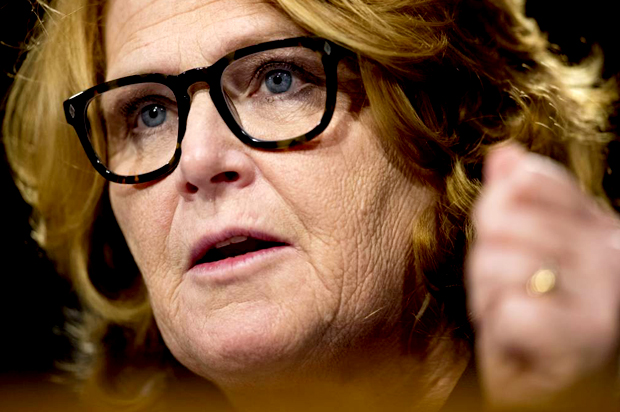In a Monday meeting with a state business group, Sen. Heidi Heitkamp, a North Dakota Democrat, said that the staunch “resistance” position that many of her party members are taking toward President Donald Trump is “a waste of my time.”
“The thing is that there are two things that are happening that are really challenging us,” Heitkamp told the North Dakota Chamber of Commerce, according to a video that was posted on YouTube of the proceedings.
“One is the resist movement, which is nothing. Just resist, right? Don’t do anything, just resist,” she said.
According to Heitkamp, merely resisting Trump is not a way to achieve sound public policy.
“I think that’s a waste of my time, if all I’m there for is to resist,” Heitkamp said. “That’s not persuasive.”
While Heitkamp has said she opposes to Trump’s current health care plan, she has also voted to confirm his picks to lead the Department of Energy, the Environmental Protection Agency and the Department of the Interior. She also joined the GOP in voting for a repeal of an Obama-era regulation on coal mine pollution into streams and rivers.
Heitkamp’s rejection of hard-line Trump opposition is unlikely to win her any popularity with Democrats at the national level, but the freshman senator is in a bit of a tough spot. Heitkamp is one of 10 Democratic senators up for re-election in 2018 in states won by the GOP in the 2016 presidential contest. The Republican contender Trump won North Dakota last year with 63 percent of the vote, while Democratic nominee Hillary Clinton received just 27.2 percent.
The Heitkamp approach of tracking more centrist in a Republican-leaning state has worked in getting politicians elected in the past. Many Democratic congressional candidates won in relatively conservative states in 2006, for instance. But some progressive groups are pushing back hard against the idea that having more moderate views about economics issues is what Democrats need.
Instead, groups like Democracy for America are citing research showing that normally left-leaning voters who decided to pull the lever for Trump did so because he had convinced many of them that he wasn’t going to favor wealthy Americans as much as Clinton did.
Since he’s been in office, however, Trump has essentially abandoned the themes of economic populism that he used to power him into office, potentially creating an opportunity for economically liberal Democrats who are more sensitive to rural culture.
Perhaps the best test case of this theory will come later this week, in the race to fill Montana’s sole seat in the U.S. House of Representatives. Democrats have nominated a singer-songwriter named Rob Quist, who isn’t abandoning economically liberal viewpoints even as he plays up his local connections.
Montana’s House seat is currently open after Trump nominated former Rep. Ryan Zinke to head the Department of Interior. Democrats haven’t held the seat since 1997 but are hoping to pull off an upset in Thursday’s special election thanks to a voting base that has become exceptionally engaged. Quist has outraised and outspent his Republican opponent, Greg Gianforte, in recent months. In April Quist collected $2.3 million while Gianforte brought in $624,000. But Republican-leaning outside groups are trying to close the gap. According to one local reporter, GOP groups have spent $3.9 million in the race while Democratic ones have forked out just $632,000.
While Quist has hit populist themes in his campaign, Republicans are accusing him of hypocrisy after he failed to pay $15,000 in property taxes to Montana and had liens imposed on him.
An April 26 poll had Quist trailing Gianforte by 15 points. No more recent surveys have been conducted.


